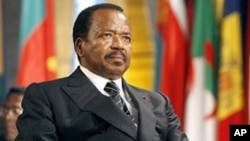A leading member of Cameroon’s parliament says a newly passed anti-terrorism bill could easily be misused to undermine the constitution.
Joseph Banadzem of the main opposition Social Democratic Front (SDF) says President Paul Biya’s government could employ the measure to crack down on dissent and muzzle the media.
The SDF argues that the measure could plunge the country into public disorder and heighten tension.
Banadzem says SDF leader John Fru Ndi will hold a news conference Thursday to warn Biya not to sign the anti-terrorism measure into law.
“It looks like the text is going to come to [stifle] the press, the civil society, [and] on political parties,” he said. “The national chairman of my party is going to have a press conference to explain why the president has to...define what terrorism is and remove sections that are geared towards the population.”
Some civil society groups staged protest demonstrations Wednesday in the capital, Yaoundé shortly after parliament approved the measure.
“The population is very irritated about it and they are calling us every day and they are saying that if the president signs it, it could lead to some public disorder,” said Banadzem.
Cameroon has recently been battling the Nigeria-based violent Islamist group Boko Haram in parts of the country’s north. The militant group has launched several attacks in Cameroon, which the government says have been repelled by security agencies.
Administration officials have portrayed the bill as being necessary to combat terrorism.
Banadzem said the opposition supports the fight against terrorism, but said lawmakers from the ruling party had attached other provisions that would allow a clamp down on civil liberties and criminalize activities of opponents of Biya’s administration.
He said as the bill stands now, journalists would have to submit their stories for prior approval by government officials, which would undermine the constitutional provisions that protect freedom of speech.
“The press men were saying to the government spokesman that are you telling us that whenever we have information we bring it to you before we publish it? He said yes, and if you don’t bring them it is punishable by law and so forth,” said Banadzem.





